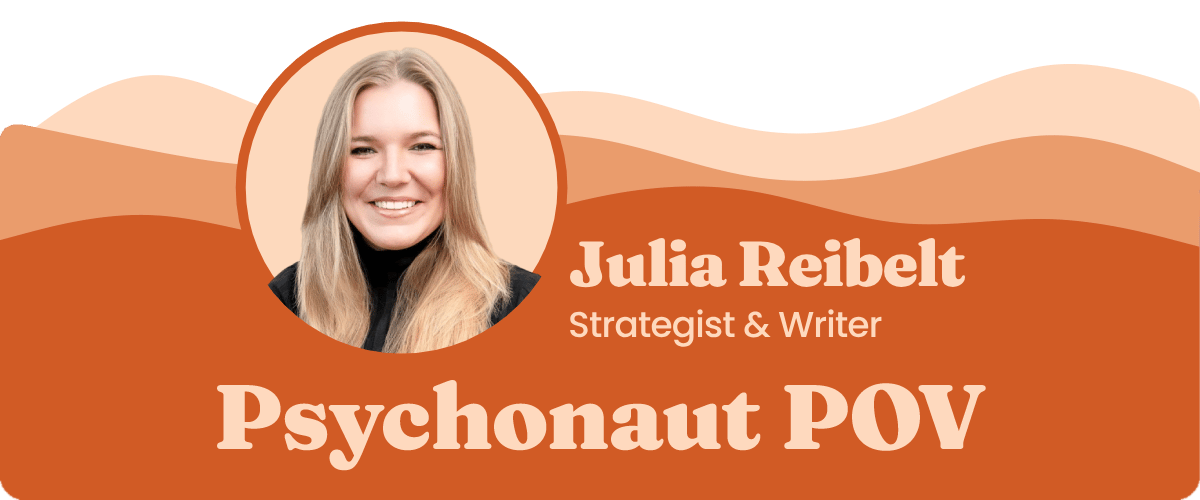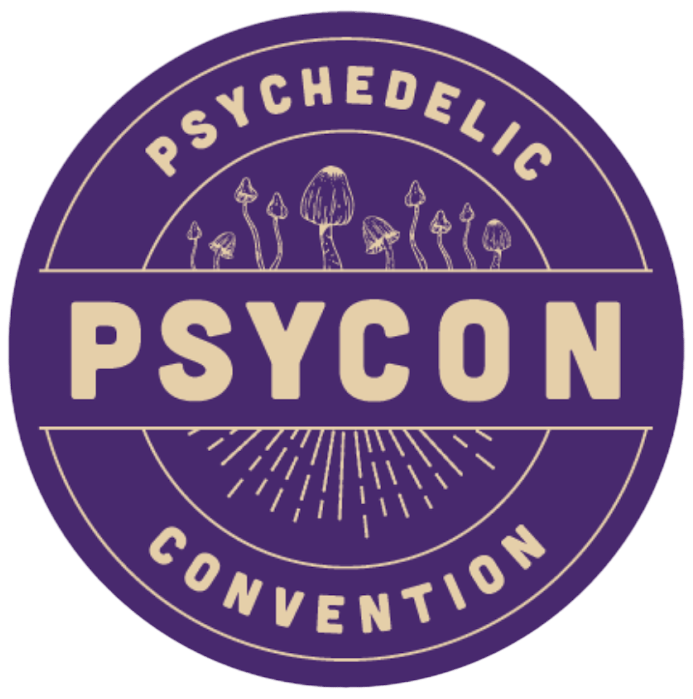Welcome to Tricycle Day. If you decide to quit social media, we support you. Just pinky swear you’ll never stop checking your email, okay? 🙏
😏 Wanna get high? We’re not talking about psychedelics for once. Today, we’re here to show you how you can reach expanded states of consciousness without any substances or drugs at all.
Intrigued? Check out our latest course, High On Your Own Supply. 👈
Julia Christina Reibelt goes straight to the roots of problems. She learned that approach from plant medicine, and so far it’s working. It’s led to a fulfilling career in psychedelics and relief from a lifelong eating disorder.
We asked Julia how she landed her psychedelic dream job, why she walked away from a 100k social media following, and how ibogaine helped her heal her relationship with food and herself.
FROM OUR SPONSORS
Market analysts expect the psychedelic industry to be worth $6.7 billion by 2030.
If you want to be a part of that future, you should be building your network now.
Come to Psycon, the psychedelic trade show for anyone who wants to jump to the forefront of this emerging industry.
You’ll meet entrepreneurs, investors, healers, and more—maybe even an NBA champion.
It’s going down in Las Vegas this May, but early movers can get a sweet discount by registering today.

What inspired you to leave a cushy management consulting job and go all in on psychedelics? How do you describe what you do now?
I started working with medicines while I was in business school as a result of shifting priorities, persisting mental health issues, and a deep curiosity about consciousness. When I returned to BCG to fulfill my two-year obligation, at first I was happy to be working on projects related to climate action and sustainability. But as I advised bankers on tactics like monetizing carbon credits, I grew frustrated. What we were doing was symptom management, at best. My experiences with psychedelics deepened my understanding of root cause interventions and led to the realization that healing disconnection on the individual level is the first and most important step to broader social change.
After leaving my job, I initially freelanced and trained as a psychedelic guide. Eventually, the foundation I now work for found me through my work consulting for MAPS PBC (now Lykos Therapeutics). The foundation’s thesis—that all the change we seek in the world starts with the individual—resonated with me. It felt like a perfect match, allowing me to apply my strategic background to a cause I'm passionate about.
Evolve exists to fund and catalyze initiatives that support the evolution of human consciousness. It’s a broad and bold mission. Our ventures division focuses on impact investing in for-profit companies. But I work in our fund division, which supports nonprofits. My role involves collaborating with psychedelic and spiritual organizations and applying my consulting skills to help them maximize their impact.
We generally look for strategic interventions that have ripple effects. One example is the non-profit Healing Breakthrough, a veteran initiative aimed at introducing MDMA therapy into the VA. The organization’s work has directly contributed to the VA’s recent decision to fund clinical research, which is the first time since prohibition that a federal agency has signaled policy shift. This development is historic and will have wide-reaching implications.
Outside your day job, you’ve racked up over 100k followers on TikTok by sharing educational content around psychedelics. Have your psychedelic experiences shaped your relationship with social media at all?
Despite not being the biggest fan of social media to begin with, I started my TikTok channel because I recognized how powerful a tool it could be for spreading messages. From the start, I set an intention to create more than I would consume, but the addictive nature of the TikTok algorithm got the best of me. I developed an unhealthy relationship with the platform, so I began to reevaluate my relationship with it. It was around that time that my first ibogaine experience cast social media in a whole new light.
The journey reminded me that there are two paths to human knowledge—thinking through the mind and feeling through intuition, or the heart. In the modern West, there's an overemphasis on the rational mind. We neglect the wisdom of embodied experiences. Many people are disconnected from their hearts, which can lead to difficulties around self-awareness, authenticity, loneliness, and meaninglessness. The modern world offers all kinds of distractions to fill this void, such as food, alcohol, drugs, and increasingly social media.
At first glance, social media might appear harmless, but in reality, it exacerbates all the problems it promises to solve. Social media fosters disconnection, comparison, and mental chatter, which itself hinders our ability to hear that inner voice. It encourages imitation over original creativity. Neurologically, it negatively impacts attention spans. I noticed this effect first hand when I struggled to follow TV storylines after a constant stream of TikTok dopamine hits. Lastly, social media eliminates idle time and boredom—the birthplace of creativity. Contrast that with the psychedelic experience, which fosters creativity.
In many ways, psychedelics provide a glimpse into absolute reality, while social media does the opposite. It constructs a narrow, artificial view that distances us from the truth. That realization prompted my decision to take an indefinite break from social media and focus my educational and personal storytelling on Substack, where I write a weekly newsletter. It’s a non-algorithmic platform that restores my hope for the internet and protects my sanity. In some ways, it’s still social, but I prefer this slower medium.
You’ve also talked openly about overcoming an eating disorder through your work with plant medicine. Can you share how that healing played out?
First, I want to address the link between social media and eating disorders. Social media has created an environment that celebrates unrealistic beauty standards that both women and men feel compelled to pursue. Our culture’s distorted perception of beauty is what allows eating disorders to be not only accepted but even praised by society. Eating disorders can be deadly, but they can also be hidden. If you’re already insecure, then getting bombarded with diet-culture messaging and dubious “what I eat in a day” videos is a recipe for disaster.
Psychedelics taught me that eating disorders—and most other emotional disorders and addictions, for that matter—are rooted in trauma. Behind my own eating disorder, there had always been a harsh inner critic guiding my every decision. During an ayahuasca ceremony, I suddenly became aware that this voice had originated from my childhood. It was also at the root of my drive to excel academically and professionally. Changing my relationship with that voice became a multi-year journey, and traditional therapies offered only partial relief. Psychedelics, on the other hand, revealed the subconscious roots of my issues so that I could truly heal. The unfortunate reality is that the therapeutic tools most people have access to today are simply not good enough. That’s why relapse rates are so high. I’m excited for psychedelic medicine to revolutionize eating disorder care.
My healing process involved processing emotions trapped beneath the surface, developing emotional coping skills, and addressing limiting beliefs that had resulted from complex trauma. While psychedelics gave me a glimpse into these beliefs, the real work lies in integration—the ongoing process of embracing all parts of myself. Psychedelics, in conjunction with Internal Family Systems (IFS) therapy, taught me to let my “shameful” or destructive parts be teachers.
Then, the final step to my recovery was to recognize my eating disorder for what it was—an unhealthy coping mechanism—and replace it with genuinely helpful ones. Healthy coping skills require emotional awareness, literacy, and regulation. Fortunately, these are skills that plant medicines like Huachuma, or San Pedro, can help you cultivate. Sustained recovery is possible when all these elements fall into place.
How do you think our readers can use digital and social media more mindfully to better support their mental and emotional health?
It all starts with intention, as is the case for most of our endeavors. Setting boundaries can be very helpful, although what works for one person might not work for another. You have to experiment to figure out what works for you. Some options include committing to blackout times, especially during peak phone usage hours like 8:00 p.m. to 8:00 a.m. Turning the phone display to grayscale can make it less enticing and reduce screen time. Finally, taking regular, prolonged breaks from social media can help you reconnect with the real world and remind you of all the positive effects that come from stepping away.
With all that said, I think it’s also very important to acknowledge that the cards are stacked against you. The largest companies in the world have poured billions of dollars into these platforms to make them as irresistible as possible. So try to remove shame from the equation and give yourself grace. Sometimes neurobiology is more powerful than discipline.
Want more from Julia?
Subscribe to her newsletter for musings and resources on consciousness, psychedelics, purpose, creativity, and healing.
UNTIL NEXT TIME
That’s all for today, Cyclists! Whenever you’re ready, here’s how we can help you.
📣 Put your brand in front of 38k psychedelic enthusiasts by sponsoring Tricycle Day. Book an ad.
🧑🎓 Learn skills and get more from your trips with our online courses. Enroll today.
😎 Style yourself out in our iconic merch. Collect a shirt.
✍ Need something else? Reply to this email. (We read every response.)
ONE CYCLIST’S REVIEW

So, how was your tricycle ride?
Forwarded this email? Subscribe here.
DISCLAIMER: This newsletter is for educational and informational purposes only and is not intended as a substitute for professional medical advice. The use, possession, and distribution of psychedelic drugs are illegal in most countries and may result in criminal prosecution.



